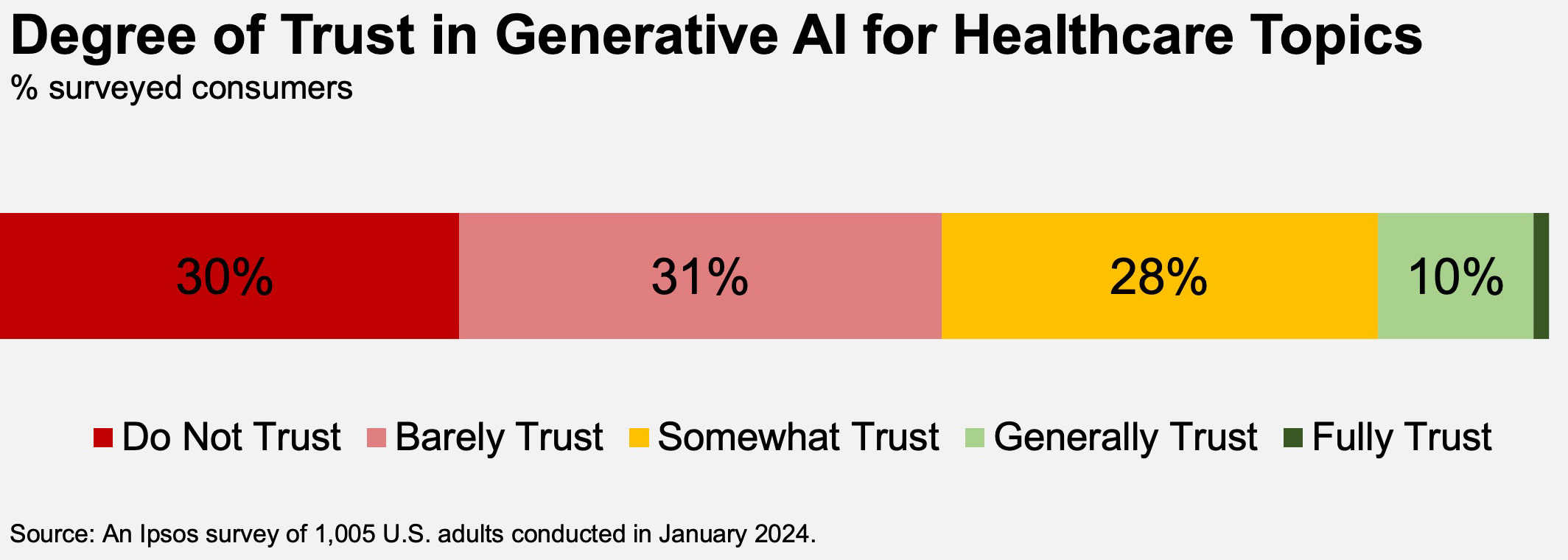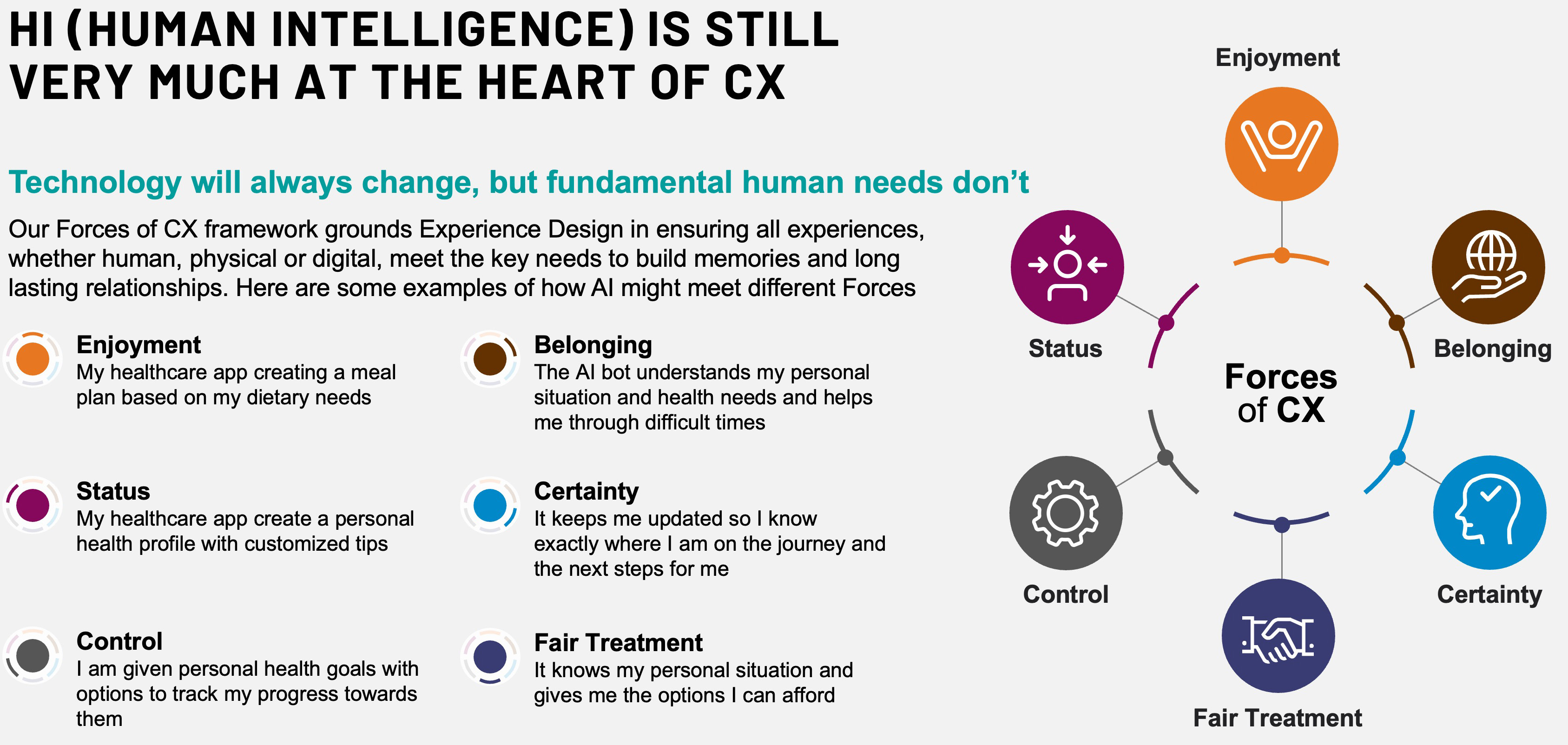Can we rely on generative AI for healthcare information?
The introduction of generative AI in healthcare has ushered in a new era of patient experience. These tools shift patients from passive recipients of care to active participants in their own well-being. While trust in generative AI is still emerging, a recent Ipsos survey shows 31% of consumers are already using generative AI for healthcare to fill needs between doctor’s appointments.
As generative AI continues to shape the patient experience, understanding how to best incorporate AI into the patient experience is crucial for healthcare organizations aiming to deliver an effective and preferred patient experience.
Consumer trust in generative AI
A significant trust gap exists between consumers and generative AI for healthcare applications. Ideally, consumers would reach a point of “cautious trust,” where they value generative AI’s insights but rely on their doctors’ recommendations for making medical decisions. A January 2024 Ipsos survey of US consumers highlights this gap. Only 38% of consumers somewhat or generally trust generative AI for healthcare topics. The majority (61%) remain distrustful (do not trust or barely trust).

Almost one-third of consumers use generative AI to access information about healthcare topics. Among these consumers, the most common uses of generative AI fall into the categories of self-assessment followed by tasks related to treatment and management of conditions. Within these categories, checking symptoms, getting information about tests and procedures, getting information about possible side effects are the most common objectives. Secondary uses of generative AI include obtaining general medical advice, self-diagnosis, and to find practical support. Interestingly, the least common uses of generative AI include logistical functions such as information about finding the right provider and treatment costs.


Consumer value of generative AI
Consumers value generative AI most for its 24/7 availability, followed by instant responses. Cost-effectiveness and the capacity to ask unlimited questions are also key benefits for consumers.

How integrating gen AI into healthcare can elevate the patient experience
While trust in generative AI for healthcare is still emerging, consumer feedback on generative AI in healthcare highlights a need that generative AI is uniquely able to address: on-demand, cost-effective support between doctor’s appointments. Unlike doctors with limited availability, generative AI offers 24/7 access to information and support. This translates to several key benefits for patients:
- Reduced Anxiety and Uncertainty: Patients can get immediate answers to questions and receive reassurance, alleviating concerns often associated with traditional care limitations.
- Empowerment Through Knowledge: Generative AI provides personalized support and recommendations on various health topics. This allows patients to take a more active role in managing their health, leading to increased confidence and reduced frustration.
- Improved Patient-Physician Interaction: Informed patients can utilize generative AI for basic needs, freeing up valuable appointment time for discussions of more critical issues. This fosters a more productive and satisfying patient-physician relationship, benefiting both parties.
To ensure successful implementation and garner consumer trust, generative AI solutions should prioritize:
- Human-Centric Design: Ipsos’ Forces of CX Framework can guide development to ensure all experiences build lasting, memorable patient relationships. The successful integration of new AI features hinges on addressing these fundamental human needs
- Human Oversight and Explainability: Generative AI should provide clear explanations for its outputs and maintain human oversight for making medical decisions.
- Robust Data Security: Upholding HIPPA compliance and the highest standards for data privacy and security is crucial to foster patient trust.

Conclusion
With a patient-centered and responsible approach, generative AI can markedly elevate the patient experience, bridging gaps between physician appointments, and augmenting the overall quality of care. For successful implementation of generative AI in healthcare, solutions must be devised keeping core human needs at the forefront and delivering reliable, appropriate information.
Ipsos partnerships
Ipsos partners with healthcare organizations to develop winning product strategies that are optimally aligned to the patient experience by:
- Mapping the patient journey to pinpoint specific unmet needs that generative AI can address to ensure that your generative AI solution targets real needs
- Crafting the right positioning and messaging strategy to foster patient and physician trust in your generative AI solution
- Measuring impact and value by identifying and tracking the right metrics to ensure your solution continues to deliver genuine value to patients and maintains competitiveness in the marketplace.


